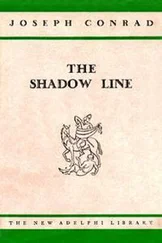D'Alcacer, left alone, wondered at the imperious tone of Lingard's call. To this observer of shades the fact seemed considerable. "Sheer nerves," he concluded, to himself. "The man is overstrung. He must have had some sort of shock." But what could it be—he wondered to himself. In the tense stagnation of those days of waiting the slightest tremor had an enormous importance. D'Alcacer did not seek his camp bedstead. He didn't even sit down. With the palms of his hands against the edge of the table he leaned back against it. In that negligent attitude he preserved an alert mind which for a moment wondered whether Mrs. Travers had not spoiled Lingard a little. Yet in the suddenness of the forced association, where, too, d'Alcacer was sure there was some moral problem in the background, he recognized the extreme difficulty of weighing accurately the imperious demands against the necessary reservations, the exact proportions of boldness and caution. And d'Alcacer admired upon the whole Mrs. Travers' cleverness.
There could be no doubt that she had the situation in her hands. That, of course, did not mean safety. She had it in her hands as one may hold some highly explosive and uncertain compound. D'Alcacer thought of her with profound sympathy and with a quite unselfish interest. Sometimes in a street we cross the path of personalities compelling sympathy and wonder but for all that we don't follow them home. D'Alcacer refrained from following Mrs. Travers any further. He had become suddenly aware that Mr. Travers was sitting up on his camp bedstead. He must have done it very suddenly. Only a moment before he had appeared plunged in the deepest slumber, and the stillness for a long time now had been perfectly unbroken. D'Alcacer was startled enough for an exclamation and Mr. Travers turned his head slowly in his direction. D'Alcacer approached the bedstead with a certain reluctance.
"Awake?" he said.
"A sudden chill," said Mr. Travers. "But I don't feel cold now. Strange! I had the impression of an icy blast."
"Ah!" said d'Alcacer.
"Impossible, of course!" went on Mr. Travers. "This stagnating air never moves. It clings odiously to one. What time is it?"
"Really, I don't know."
"The glass of my watch was smashed on that night when we were so treacherously assailed by the savages on the sandbank," grumbled Mr. Travers.
"I must say I was never so surprised in my life," confessed d'Alcacer. "We had stopped and I was lighting a cigar, you may remember."
"No," said Mr. Travers. "I had just then pulled out my watch. Of course it flew out of my hand but it hung by the chain. Somebody trampled on it. The hands are broken off short. It keeps on ticking but I can't tell the time. It's absurd. Most provoking."
"Do you mean to say," asked d'Alcacer, "that you have been winding it up every evening?"
Mr. Travers looked up from his bedstead and he also seemed surprised. "Why! I suppose I have." He kept silent for a while. "It isn't so much blind habit as you may think. My habits are the outcome of strict method. I had to order my life methodically. You know very well, my dear d'Alcacer, that without strict method I would not have been able to get through my work and would have had no time at all for social duties, which, of course, are of very great importance. I may say that, materially, method has been the foundation of my success in public life. There were never any empty moments in my day. And now this! . . ." He looked all round the Cage. . . . "Where's my wife?" he asked.
"I was talking to her only a moment ago," answered d'Alcacer. "I don't know the time. My watch is on board the yacht; but it isn't late, you know."
Mr. Travers flung off with unwonted briskness the light cotton sheet which covered him. He buttoned hastily the tunic which he had unfastened before lying down, and just as d'Alcacer was expecting him to swing his feet to the deck impetuously, he lay down again on the pillow and remained perfectly still.
D'Alcacer waited awhile and then began to pace the Cage. After a couple of turns he stopped and said, gently:
"I am afraid, Travers, you are not very well."
"I don't know what illness is," answered the voice from the pillow to the great relief of d'Alcacer who really had not expected an answer. "Good health is a great asset in public life. Illness may make you miss a unique opportunity. I was never ill."
All this came out deadened in tone, as if the speaker's face had been buried in the pillow. D'Alcacer resumed his pacing.
"I think I asked you where my wife was," said the muffled voice.
With great presence of mind d'Alcacer kept on pacing the Cage as if he had not heard.—"You know, I think she is mad," went on the muffled voice. "Unless I am."
Again d'Alcacer managed not to interrupt his regular pacing. "Do you know what I think?" he said, abruptly. "I think, Travers, that you don't want to talk about her. I think that you don't want to talk about anything. And to tell you the truth I don't want to, either."
D'Alcacer caught a faint sigh from the pillow and at the same time saw a small, dim flame appear outside the Cage. And still he kept on his pacing. Mrs. Travers and Lingard coming out of the deckhouse stopped just outside the door and Lingard stood the deck-lamp on its roof. They were too far from d'Alcacer to be heard, but he could make them out: Mrs. Travers, as straight as an arrow, and the heavy bulk of the man who faced her with a lowered head. He saw it in profile against the light and as if deferential in its slight droop. They were looking straight at each other. Neither of them made the slightest gesture.
"There is that in me," Lingard murmured, deeply, "which would set my heart harder than a stone. I am King Tom, Rajah Laut, and fit to look any man hereabouts in the face. I have my name to take care of. Everything rests on that."
"Mr. d'Alcacer would express this by saying that everything rested on honour," commented Mrs. Travers with lips that did not tremble, though from time to time she could feel the accelerated beating of her heart.
"Call it what you like. It's something that a man needs to draw a free breath. And look!—as you see me standing before you here I care for it no longer."
"But I do care for it," retorted Mrs. Travers. "As you see me standing here—I do care. This is something that is your very own. You have a right to it. And I repeat I do care for it."
"Care for something of my own," murmured Lingard, very close to her face. "Why should you care for my rights?"
"Because," she said, holding her ground though their foreheads were nearly touching, "because if I ever get back to my life I don't want to make it more absurd by real remorse."
Her tone was soft and Lingard received the breath of those words like a caress on his face. D'Alcacer, in the Cage, made still another effort to keep up his pacing. He didn't want to give Mr. Travers the slightest excuse for sitting up again and looking round.
"That I should live to hear anybody say they cared anything for what was mine!" whispered Lingard. "And that it should be you—you, who have taken all hardness out of me."
"I don't want your heart to be made hard. I want it to be made firm."
"You couldn't have said anything better than what you have said just now to make it steady," flowed the murmur of Lingard's voice with something tender in its depth. "Has anybody ever had a friend like this?" he exclaimed, raising his head as if taking the starry night to witness.
"And I ask myself is it possible that there should be another man on earth that I could trust as I trust you. I say to you: Yes! Go and save what you have a right to and don't forget to be merciful. I will not remind you of our perfect innocence. The earth must be small indeed that we should have blundered like this into your life. It's enough to make one believe in fatality. But I can't find it in me to behave like a fatalist, to sit down with folded hands. Had you been another kind of man I might have been too hopeless or too disdainful. Do you know what Mr. d'Alcacer calls you?"
Читать дальше












